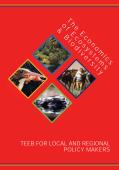
This document is intended to offer inspiration and practicable suggestions for the improvement and maintenance of the welfare of the environment and its inhabitants. TEEB in Local and Regional Policy and Management shows how by taking nature’s benefits into account, decision makers can promote local development to ensure human well-being and economic growth and stability, while also maintaining environmental sustainability.
This volume of the TEEB series of studies explores the potential for local development provided by an approach based on nature. It offers examples of successful implementation of this approach from across the world, highlighting the importance of local decision making in management and planning. The study provide tools and practical guidance for reform, and examines what local governments can do with respect to natural resource use and management, maintaining and supporting biodiversity, local and regional urban and spatial design, as well as market-based approaches, such as Payment for Ecosystem Services (PES).
This paper examines the processes used in the United States and Mexico to assess the economic costs and benefits of environmental improvement, the kinds of information obtained from these procedures, and the additional knowledge that is needed about both elements to improve understanding of the problems and prospects of advancing a green growth agenda. Because environmental and other development needs are large and resources are limited, it is important to choose the best projects, those with the highest returns on both public investments and private resources harnessed by regulation. The United States is a well-recognized leader in the use of quantitative methods to evaluate options for environmental regulation and policy. Mexico represents a case where a country has made clear advances in reforming its economy and in introducing transparency in its regulatory processes for environmental and other policy areas.
This paper surveys the state of knowledge about the trade-related environmental consequences of a country's development strategy along three channels: (i) direct trade-environment linkages (overexploitation of natural resources and trade-related transport costs); (ii) 'virtual trade' in emissions resulting from production activities; and (iii) the product mix attributes of a 'green-growth' strategy (environmentally preferable products and goods for environmental management). Trade exacerbates over-exploitation of natural resources in weak institutional environments, but there is little evidence that differences in environmental policies across countries has led to significant 'pollution havens.' Trade policies to 'level the playing field' would be ineffective and result in destructive conflicts in the World Trade Organization. Lack of progress at the Doha Round suggests the need to modify the current system of global policy making.
The paper aims to highlight some of the most important implementation issues associated with the greening of global value chains with special attention given to how public policies and business strategies can support each other in meeting the challenge, particularly in developing countries. This requires a systemic view of global value chains that includes downstream supply chains and explicitly takes into account the relationships between regular members (raw materials providers, component manufacturers, and assembly plants, notably) and their clean-tech suppliers. It also involves a careful description of the business landscapes of global value chains as well as reliable environmental metrics and data, carefully examining how these can be shared among global value chain members and their stakeholders.
Using novel data on patents, trade of equipment goods, and foreign direct investments and insights from the economic literature, the paper seeks to lay out the state of knowledge on the role of innovation and the diffusion of technologies in the greening of global value chains as well as some of the main policy issues. A special emphasis is put on developing countries -- distinguishing emerging economies and least-developed countries -- and on climate-mitigation technologies. Emerging economies are already reasonably well integrated in the global economy. As a consequence, technologies flow in through the imports of capital goods and local investments by multinational enterprises owning technologies. Pushing further technology transfer requires strengthening intellectual property rights, lowering barriers to trade and investments and improving technological absorptive capacities. In contrast, their role in innovation is limited. Standard tools of innovation policy - public research and development, public support to private research and development, better access to finance - should develop.
